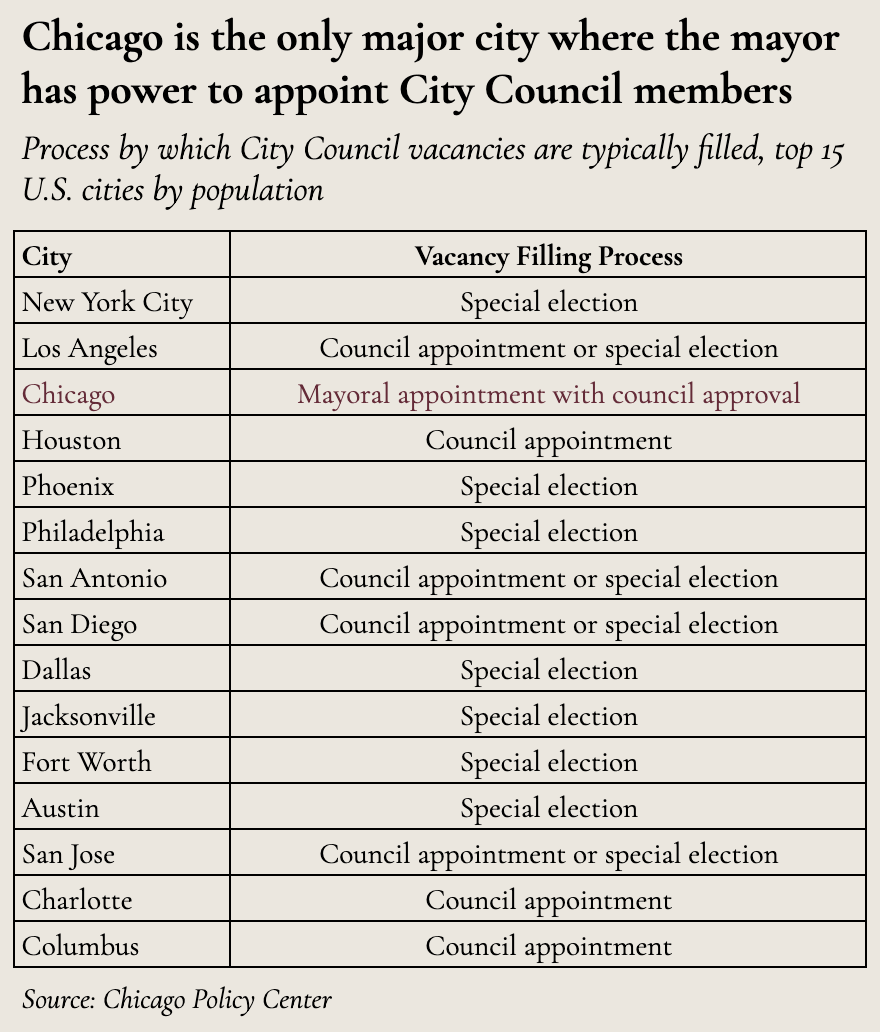With no city constitution, Chicago's mayor writes the rules
In a late Friday news dump, Chicago Mayor Brandon Johnson announced the new alderman of the 27th Ward: Walter “Red” Burnett.
He is, of course, the son of former 27th Ward Ald. Walter Burnett. Chicago City Council will now vote to confirm the younger Burnett ahead of their next meeting on Sept. 25.
No other big city functions this way, according to a Chicago Policy Center review of the 15 largest U.S. cities by population.
Chicago is the only major city where the mayor directly appoints members of the City Council.
Why is Chicago such an outlier? Because the process for filling a Council vacancy rests in Illinois state law. Meanwhile, every other major city lays out this process in their respective city charters.
Chicago is the only major city in the country without a charter — a foundational document akin to a local constitution that sets clear, consistent rules for how government operates.
Instead, much of Chicago’s governance is shaped by state law, city code, or tradition, leaving wide discretion in the hands of whoever occupies the mayor’s office.
Without a charter, the mayor writes the rules
When there was a City Council vacancy in the 35th Ward earlier this year, Johnson required candidates for the job to have five years of government or public service experience.
This job requirement clearly favored Johnson’s preferred pick, Anthony Quezada.
But the mayor had no such requirement for filling the Burnett seat. Had he kept it, “Red” Burnett would not have been qualified.
The mayor’s appointment power, coupled with low voter turnout in February municipal elections and the absence of term limits, is an affront to democracy.
A University of Illinois at Chicago analysis found 12 mayoral appointees on the council voted with the mayor 100% of the time on key issues from 2007-2008. Worse, more than 30 aldermen have been convicted of corruption since the 1970s, with at least five of them first taking office via mayoral appointment, including Danny Solis and Arenda Troutman.
A charter wouldn’t just prevent selective rule changes by the mayor. It would strengthen checks and balances, enshrine rules for special elections, and more clearly define the balance of power between the mayor and the City Council. Perhaps most importantly, it would create consistency, so standards could not shift to favor a friend or the relative of a longtime alderman.
The city has endured decades of corruption, low trust in institutions and entrenched political families. A modern charter would not erase those legacies overnight, but it would give residents a stronger defense against them going forward.
In the news
I joined Thom Serafin and Lissa Druss on The Crisis Cast for a wide-ranging conversation.
On hope for Chicago:
Serafin: I have a burning question. Talking about our beautiful city. What keeps you up at night regarding our city?
Berg: I had one of those nights recently after there was another pension sweetener bill signed for the city. Unanimous support from the General Assembly. The governor signed this just a few weeks ago. It's taking the worst pension crisis in the country and making it even worse … And I thought, ‘Do our leaders care about the future of the city? Do they care that our kids and grandkids are going to be paying that?’ That can get pretty dark if you dwell on it. But I like the line that Mr. Rogers would say in times of crisis … he says, ‘always look for the helpers.’ And there's so many helpers in the city of Chicago who really do care. Because if you look for the helpers, you'll know that there's hope. I know I've talked to you guys about this city charter effort and many people who are interested in that. Just the normal folks even in my neighborhood who I know care about that idea and are really interested in learning more. And there's so much energy here. There's so many people here that really do care. If you focus on the helpers, that existential dread goes away.
On the state economy:
Serafin: Where is the economy of Illinois, and specifically Chicago, going to be when you get our age in the next 20 years? Where is Chicago going from a planning perspective?
Berg: I've always thought that Illinois was uniquely suited for the next industrial revolution. We have a lot of white collar talent in the city of Chicago and a lot of tech talent that could be on the bleeding edge of the software innovations in AI … amazing tech talent coming out of our universities, paired with an amazing industrial legacy around the state, in the collars and in downstate. When you think about Caterpillar, when you think about the role that McCormick and the reaper played in the history of our country, or the refrigerated rail car, these big industrial innovations. The future of the economy is marrying those two things: the hard tech manufacturing with software. As a state, we're so well positioned to do that. We just have to get our boot off the necks of people who want to make those investments. And I think we're foregoing billions of dollars in investment because of silly policies, whether it's sometimes unions [that] want this mafia style shakedown of any kind of new dollar that comes into the state. It's very Trumpian. I think Trump also conceives of the national economy as a series of deals made with politicians [and] I think that's how Illinois sort of conceives of its economy. It's really unhelpful. All the way to things like the Biometric Information Privacy Act. That is a giveaway to the trial bar that really scares away a ton of tech investment … so we need to get really serious about letting the capital flow into the state. All of these problems get much easier to solve when we're growing. When we're shrinking, they're impossible, but when we're growing, they're possible to solve.”
On giving Chicago the option to seek Chapter 9 municipal bankruptcy protection:
Berg: We need to reframe this issue because I think it's one of the only things that can actually give us a clean slate for more responsible government. I said this on Chicago Tonight last week. We need to look at authorizing Chapter 9 municipal bankruptcy for the city of Chicago. Twenty-four other states allow it, California allows it, Texas allows it … If you look at, for example, the student debt crisis, one of the most insidious things about it is that young people have all this college debt poured on them [but] they can't go into bankruptcy on student loan debt. That's a real injustice because in every other part of our lives, if we get overextended or we make a few bad deals, we get to go to a judge and say, ‘Hey help me out here. I can't pay this. Let me cut some deals.’ It's the same thing with the city of Chicago. You can change pensions that way and [this] is the only way to fix the parking meter deal. You go to a bankruptcy judge.






Great piece, Micky! Do you know if Johnson the only mayor to add such a candidate-specific requirement like he did for Quezada?
Austin - I've learned so much from your media appearances, articles, social media posts and now, The Last Ward. Many of us have long accepted politics here will always be corrupt. Thank you for showing us how, with enough public education & outreach, voters can finally demand governance that is good for our beloved city and state.
most corrupt city in America.